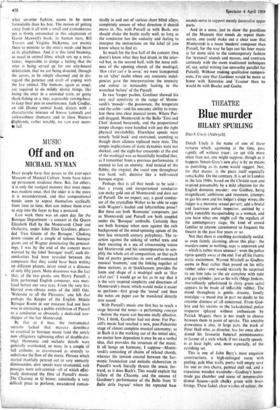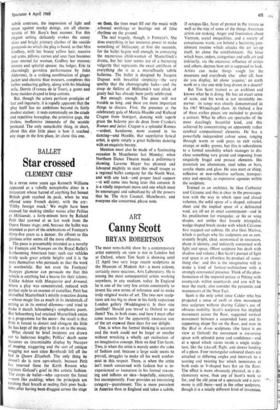Dutch Uncle (Aldwych)
THEATRE
Blue murder
HILARY SPURLING
Dutch Uncle is the name of one of those tortures which, agonising at the time, pass rapidly off without trace: an apt title more often than not, one might suppose, though as it happens Simon Grey's new play is by no means as punishing as its name would suggest. Nor, for that matter, is the piece itself especially remarkable. On the contrary. It is set in London in the late 1940s, based on the Christie case and inspired presumably by a mild affection for the English domestic murder: one Godboy, being insignificant, ambitious and impotent, attempts to gas his own and his lodger's dingy wives;.the lodger is a moronic sexual pervert; add a brutal and lascivious police inspector, assisted by a hefty constable masquerading as a woman, and you have what one might call the regulars of the contemporary stage, the kind of crowd familiar to anyone accustomed to frequent the theatre in the past five years or so.
Not that there is anything particularly sordid, or even faintly alarming, about this play : the murders come to nothing, rape is unproven and —which is rather more unusual—even the police tiptoe quietly away at the end. For all his frantic erotic excitement, Warren Mitchell as Godboy seems to float rather than pound on his nifty rubber soles—one would scarcely be surprised to see him take to the air complete with tube and gas cylinder; just as his wife (Megs Jenkins, marvellously upholstered in shiny green satin) appears to be made of inflatable rubber. The mood throughout is gentle, dreamy, fondly nostalgic—a mood due in part no doubt to the extreme dimness of all concerned. From God- boy and his victims to the lackadaisical police inspector (played without enthusiasm by Patrick Magee), there is not much to choose between them in point of uptake. This amiable drowsiness is also, in large part, the work of Peter Hall who, as director, has for once aban- doned his favourite funereal portentousness in favour of a style which, if not exactly speedy, is at least light; and, most especially, of the ravishing set.
This is one of John Bury's most exquisite constructions, a high-ceilinged room with peeling, pale blue walls, pretty well empty save for one or two chairs, painted dull red, and a capacious wooden wardrobe—Godboy's home- made gas chamber and scene of innumerable dismal fiascos—pale chalky green with brass fittings. These faded, clear washes of colour, the
subtle contrasts, the impression of light and -space against murky doings, are all charac- teristic of Mr Bury's best manner. For this elegant setting delicately evokes the sunny skies and bright primary clashes of the seaside postcards on which the play is based, so that Mrs Godboy, with her brassy yellow hair, massive red arms, pillowy curves and sour face becomes your eternal fat woman, Godboy her morose,:. minute and spiteful spouse; the lodger, Eric (a charmingly gormless performance by John Alderton), in a striking combination of ginger jacket and electric blue trousers, completes this rather endearing gallery, along with his blushing wife, Dorrie (Frances de la‘Tour), a gaunt and bony maiden draped in limp cottons.
But, though the actors perform prodigies of tact and ingenuity, it is rapidly apparent that the play itself has no ambitions beyond its fairly modest station : it rests contentedly on the crude and repetitive horseplay, the primitive gags, the tireless, inoffensive innuendo of the seaside postcard. The only remarkable thing, in short, about this dim little piece is how it reached any stage in the first place, let alone this one.



































 Previous page
Previous page